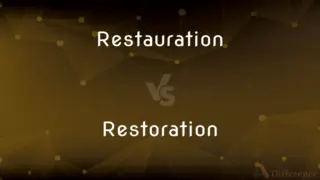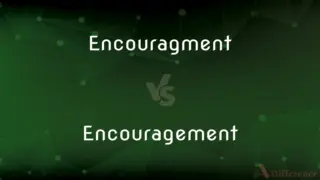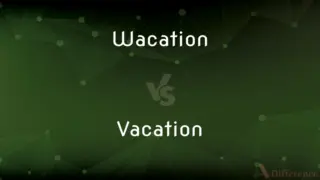Made vs. Maked — Which is Correct Spelling?
By Tayyaba Rehman — Updated on March 25, 2024
"Made" is the correct spelling, whereas "maked" is incorrect. Made is the past and past participle of "make," signifying creation or construction.
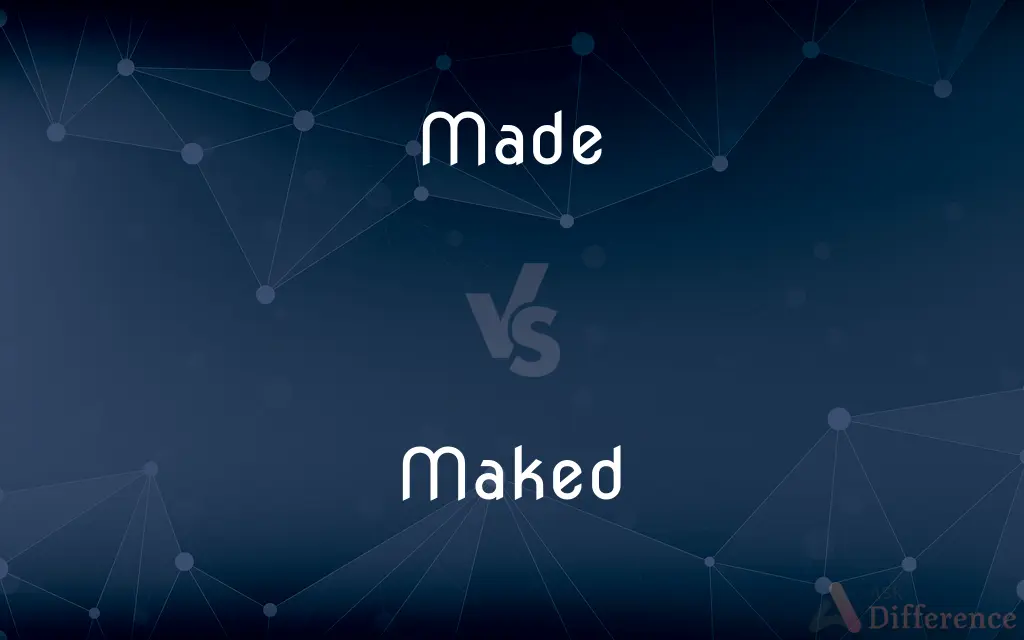
Table of Contents
Which is correct: Made or Maked
How to spell Made?

Made
Correct Spelling

Maked
Incorrect Spelling
ADVERTISEMENT
Key Differences
"Made" rhymes with "fade," both contain only one syllable.
"Baked" from "bake" might help remember "made" from "make."
Using “made” in familiar phrases like “made it” can reinforce the correct spelling.
Note that "make" changes to "made" in the past, without adding "ed."
Recall the phrase "hand-made," which is standard in English.
ADVERTISEMENT
How Do You Spell Maked Correctly?
Incorrect: He maked a cake for his sister's birthday.
Correct: He made a cake for his sister's birthday.
Incorrect: They have maked a lot of noise during the movie.
Correct: They have made a lot of noise during the movie.
Incorrect: She maked a beautiful drawing in art class.
Correct: She made a beautiful drawing in art class.
Incorrect: I maked my bed as soon as I got up.
Correct: I made my bed as soon as I got up.
Incorrect: We maked plans to go to the beach next weekend.
Correct: We made plans to go to the beach next weekend.
Made Definitions
"Made" denotes having caused something to happen.
She made a scene at the party.
"Made" implies having been created or formed.
He made a beautiful painting.
"Made" can indicate having initiated into a particular role or position.
The coach made him captain.
"Made" also can mean prepared, especially in the context of food.
She made dinner for the family.
Past and past participle of make
Made in a particular place or way
A Japanese-made camera
Handmade chocolates
Past tense and past participle of make.
Produced or manufactured by constructing, shaping, or forming. Often used in combination
Handmade lace.
Ready-made suits.
Produced or created artificially
Bought some made goods at the crafts fair.
Having been invented; contrived
These made excuses of yours aren't plausible.
Assured of success
A made man.
A grub or maggot.
Simple past tense and past participle of make
(Geordie) myek
(Wearside) mak
Artificially produced; pieced together; formed by filling in; as, made ground; a made mast, in distinction from one consisting of a single spar.
Having the sheets and blankets set in order; - of a bed; as, is the bed made?.
Successful or assured of success; as, a self-made man.
Now I am a made man forever.
Produced by a manufacturing process;
Bought some made goods at the local store; rope and nails
(of a bed) having the sheets and blankets set in order;
A neatly made bed
Successful or assured of success;
Now I am a made man forever
"Made" may imply having assured the success or failure of something.
He made his fortune in real estate.
Made Meaning in a Sentence
He made a new friend at school today.
Every year, he made a birdhouse in his woodworking class.
They made a decision to adopt a puppy.
He made a model airplane from the kit he received.
I made a promise to help my brother with his homework.
She made a list of groceries to buy.
The students made a movie about recycling for their project.
She made a delicious apple pie for dessert.
The family made a trip to the mountains every winter.
They made a campfire to stay warm at night.
The team made a great effort to win the game.
She made a mistake in her math homework.
The class made a mural for the school's anniversary.
We made a pact to always tell each other the truth.
He made a joke that made everyone laugh.
She made a discovery in her science project.
I made a drawing of my pet dog.
Common Curiosities
What is the verb form of made?
“Made” is the past and past participle of the verb "make."
Which vowel is used before made?
Typically, “a” or "e" could precede “made” (a made bed, the cake was made).
What is the root word of made?
The root is the Old English “macian.”
What is the plural form of made?
No plural – verb tenses don’t have plurals.
Which conjunction is used with made?
No specific conjunction is tied to “made.”
Is made an adverb?
No.
Which preposition is used with made?
Various prepositions can be used: “of,” “by,” “in,” etc.
Why is it called made?
It’s derived from the Middle English word “maken.”
What is the pronunciation of made?
/meɪd/
What is the singular form of made?
“Made” itself, as it serves as past tense and participle.
Is made a countable noun?
No.
Which determiner is used with made?
Could be “this,” “that,” “my,” etc.
What is the first form of made?
Make.
Is made a noun or adjective?
It can function as a verb or adjective depending on context.
What part of speech is made?
Verb (past tense/participle) or adjective.
Is made an abstract noun?
No.
Is the word “made” a Direct object or an Indirect object?
Neither, it’s typically a verb or adjective.
How do we divide made into syllables?
It is one syllable and cannot be divided.
What is the second form of made?
Made.
What is the third form of made?
Made.
Which article is used with made?
Either "a," "an," or "the" depending on the context.
Is made a negative or positive word?
Neutral.
Is made a collective noun?
No.
Is the made term a metaphor?
It can be used in metaphorical expressions.
Is the word made a Gerund?
No.
How many syllables are in made?
One.
What is a stressed syllable in made?
It has one syllable which is stressed.
Is made a vowel or consonant?
It is a word, not a letter.
Is the word made imperative?
No.
What is another term for made?
Crafted, produced.
What is the opposite of made?
Destroyed.
How is made used in a sentence?
“She made a lovely dress for the occasion.”
Share Your Discovery
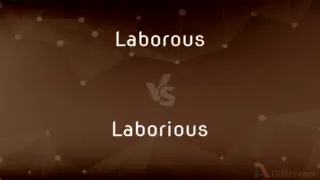
Previous Comparison
Laborous vs. Laborious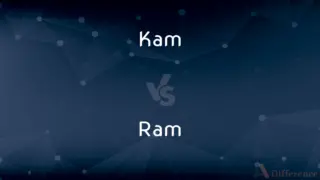
Next Comparison
Kam vs. RamAuthor Spotlight
Written by
Tayyaba RehmanTayyaba Rehman is a distinguished writer, currently serving as a primary contributor to askdifference.com. As a researcher in semantics and etymology, Tayyaba's passion for the complexity of languages and their distinctions has found a perfect home on the platform. Tayyaba delves into the intricacies of language, distinguishing between commonly confused words and phrases, thereby providing clarity for readers worldwide.












